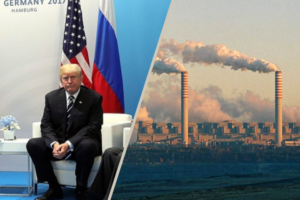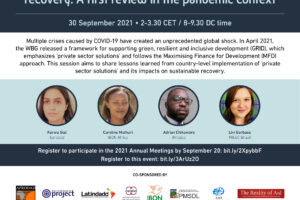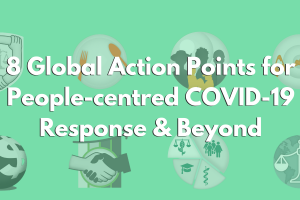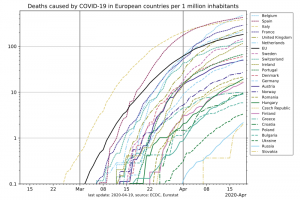The world is at a critical juncture. States’ responses and measures that only aim to prop up the pre-pandemic system of corporate giants, ultra-wealthy capital-holders, low-waged Southern labour, and widening inequalities would be insufficient for peoples’ development. It is crucial to move away from current dominant assumptions on financing sustainable development and related policy norms.
There is an increasing consensus that the COVID-19 pandemic and corresponding workplace closures are taking a toll on the world economy in 2020, and some say, even beyond. The protracted slump already seen in the previous years are thus accelerated. Today’s economic downturn would especially pose huge challenges for peoples in the global South, who have been already experiencing gaps in social services, economic rights, and development as part of the pre-pandemic status quo.
The world is at a critical juncture. States’ responses and measures that only aim to prop up the pre-pandemic system of corporate giants, ultra-wealthy capital-holders, low-waged Southern labour, and widening inequalities would be insufficient for peoples’ development. In the current global development agenda, the important questions are around the means of implementation[i] (financing for development, also technology), together with the policy norms and the forms of international cooperation that must come with it. Answering these today does not happen in a vacuum, but instead in contexts where big, profit-oriented corporations and banks continue to be major actors; neoliberal policies remain stubbornly the norm; and with state repression targeting civil society and people’s organisations in many countries.
It is crucial to move away from current dominant assumptions on financing sustainable development and related policy norms, as articulated, for instance, in the 2020 Financing for Sustainable Development Report (2020 FSDR) of the Inter-Agency Task Force (IATF) on Financing for Development.[ii] The IATF is mandated to report annually on progress and issues in financing for development and the means of implementation–including through the release of such a publication that covers trends and major thematic issues (i.e., domestic public resources, private business and finance, development cooperation, trade, debt, systemic issues, etc).[iii] The IATF is comprised of 60 international actors, from various United Nations offices to the International Monetary Fund, the World Bank Group, the World Trade Organisation, among others.
The “private sector”
A prominent aspect of dominant development discourse today is the role of the private sector in development—a term encompassing micro-, small and medium enterprises (MSMEs) as well as transnational and multinational corporations (TNCs and MNCs). The 2020 FSDR acknowledges that the bigger corporations have dominance and market power (e.g., technology firms). Corporations, especially such influential corporate giants, can no longer ignore sustainability issues, the report admits, since otherwise they will lose out on “business opportunities linked to the SDGs [sustainable development goals]” or that they could be subject to “sustainability scandals” of public reputation.
Indeed, corporations mention the SDGs in rhetoric, but are largely not serious in measuring their concrete practices–with the FSDR citing a study of 700 MNCs wherein 72% mention the SDGs, but only 23% have “meaningful key performance indicators”. There are also admissions that the current push for “sustainable investment” is compromised by the risk that the SDGs have been used as a “marketing tool” (i.e. “SDG-washing”). A bigger reality check is in how a majority of the biggest corporations do not actually operate with human rights concerns in mind—more than half of 200 of the largest publicly traded companies scored less than 20% in an assessment of human rights indicators.[iv]
Big businesses are benefitting from their entry into the current development agenda, while the benefits to the people are not as clear.
These show how big businesses are benefitting from their entry into the current development agenda, while the benefits to the people are not as clear. There must be a rethinking of dominant assumptions today that big private sector actors are crucial “stakeholders” in creating conditions for sustainable development. The public interest must not only be another consideration alongside financial return, contrary to sustainable investment rhetoric, but must be above anything else to “leave no one behind.” This means also rethinking the prioritisation of a variety of instruments to promote (and mobilise) big private sector investment in the South.
There are frameworks on engaging with the private sector in development cooperation, such as the 2019 Kampala Principles. References to “the growing interest…to partner with the private sector” must be elaborated: that this must refer more to Southern enterprises that could contribute to strategic industrialisation and structural change, not to TNCs and MNCs which have historically harmed development prospects.
Financing and planning development: Where are the people?
An emerging catchword in today’s development conversations is the need for Integrated National Financing Frameworks (INFFs). These refer to frameworks to link up countries’ development visions with adequate financing plans. Once mentioned in a 2015 document on implementing the sustainable development agenda, the Addis Ababa Action Agenda, the INFF idea is now promoted especially for countries in the global South in major development conversations.
A crucial principle for INFFs and development plans, the 2020 FSDR rightly claims, would be ownership at country-level. This must be taken further in asserting that INFFs could be used to align development cooperation with national priorities if they are democratically-led. These presuppose people’s substantive influence in country-level development planning and processes; a possibility challenged by today’s democratic erosion, from the different forms of harassment to the killings of activists in the global South. As it is, there is an uneven terrain in countries, usually with strong influence of big business vis-à-vis smaller firms, and vis-à-vis peoples and their organisations. Ownership must primarily mean democratic ownership of working peoples, and it will be essential to ensure that any national financing framework and planning process would result to long-term and positive development outcomes.
Ownership must primarily mean democratic ownership of working peoples, and it will be essential to ensure that any national financing framework and planning process would result to long-term and positive development outcomes.
Contrary to principles of ownership are the suggestions in the report that country private sector assessment tools of the International Finance Corporation (IFC, the private sector arm of the World Bank Group) could be “helpful” in INFFs, tools which historically veer toward promoting weaker regulations and greater returns for private capital. There is a need to assert that attacks on civil-political rights and democratic spaces are not just, as cited in the FSDR, “limits on inclusiveness” and civil society “capacity limitations,” but major impediments in achieving country ownership in the South.
Aid as a source to finance development
Aid, or official development assistance (ODA), is supposedly a historical commitment and responsibility of the global North, with an official mandate of addressing poverty. That is, its use must not be for foreign policy or commercial interests. Today, such flows are facing issues in quantity and quality—ODA declined by 4.3% in 2018 and still below 0.7% GNI commitment, and even face challenges in ensuring its public interest objectives. The 2020 FSDR does not address the point that already anaemic ODA flows must not be used in financing that benefits private interests, but towards realising ODA’s supposed uniquely public function.
Quantity of ODA must improve. Donor countries should reverse the decline in ODA seen prior to the pandemic, and must fulfil the 0.7% GNI aid target in the form of unconditional grants.
Much is to be done as well in terms of quality and of fulfilling development effectiveness. One issue of quality is “untying aid”—fully shifting away from aid that is tied to be used for projects and purchases that involve the donor states’ corporations. While 82% of aid has been untied by 2018, the report admits uneven “progress” across donors, and that ODA is “not fully untied in practice” as Northern firms have still captured contracts.
Another major issue is using already scarce aid not to directly address poverty, but to “mobilise,” “leverage,”or “catalyse” commercial financiers to funnel money into developing countries. This has been a growing trend around a narrative that the “trillions” that these countries need for their infrastructure and development can only be financed with the “help” of finance capital.
Today’s hype on “innovative” ways of raising resources is founded on a deceptive narrative: that development is firstly a financing gap problem, instead of entailing political questions.
But such arrangements mobilise less finance towards least developed countries (only 6% of the total amount between 2012-2017 went to LDCs), according to the FSDR, because business in these countries are riskier. Thus so-called “blended finance” deals follow private interests that seek more profitable returns. Such deals, the FSDR admits, are 1) not a “panacea to fill in the investment gap;” 2) they “have generally had only a modest impact on poverty;” and 3) that “even more often, the developmental impact is unknown.” These alone must spark a rethinking of the growing discourse on “mobilising” private finance as part of the functions of ODA, instead of insisting on the premises of blending as long as it must be pushed away from profitability concerns.
With the FSDR admission that “Governments are involved if at all only after the investment decision is made [in many blending transactions],” it is testament to a big gap in country ownership, and more so, in democratising development. This must reverse the recommendations that countries develop blending strategies, and that blending only needs to be “tailored” to domestic contexts. There must also be stress on climate finance as additional to ODA.
Despite these, multilateral development banks (the World Bank, etc.,) are making moves to “support the delivery of the 2030 Agenda,”[v] with the levels of “mobilization of private finance” used as a main measure of results. The statement about the COVID-19 from the Development Assistance Committee (DAC) of the Organisation for Economic Co-operation and Development (OECD) not only affirms the roles even of “international private-sector actors”[vi] (e.g., TNCs), but also remain weak in asserting the public character of ODA, as the OECD-DAC claims that they “will strive to protect ODA budgets, [and] encourage other financial flows”. Today’s hype on “innovative” ways of raising resources–from securitisation, “green bonds,” to pooling private and public funds—is founded on a deceptive narrative: that development is firstly a financing gap problem (and thus primarily needs new ways of generating funds), instead of entailing political questions.
The political questions remain true in the time of pandemic and economic slump, and are even more urgent. It is imperative that people’s organisations must have substantive voices in ensuring that aid flows to where they could fulfil people’s needs, and in determining aid allocations for emergency responses and long-term development. Donors must also consider aid flows directly to people’s organisations, community initiatives, and civil society responding to the pandemic.
Move away from debt dependence
In the short term, debt payments that are due in 2020 and 2021 must be cancelled with no interest, charges, and penalties. Longer-term, even permanent, cancellations must also be options.
Many developing countries were already tightening their belts to pay debts before the pandemic, partly attributable, the FSDR agrees, to post-2008 crisis low interest rates in the global North which drove commercial lenders to flock to the South. Southern countries are now facing bigger debt risks with the economic side-effects of COVID-19.
In the FSDR, the recommendation for creditors to “help borrowers avoid debt traps,” likely a veiled reference to Western state discourse on China, must be balanced with the report’s admissions that 1) commercial lending is also responsible for increased Southern debt especially after 2016, and that post-2008 lower interest rates (a move led by Northern states such as the US) is a crucial contextual factor in Southern economies growing debt.
Aside from countries’ management of debt, the trajectory must be away from dependency on debt flows and towards better, progressive domestic resource mobilisation as well as people-led development planning. The huge risks of debt crises from the 2020 economic downturn show the need for immediate debt cancellations.
In the short term, debt payments that are due in 2020 and 2021 must be cancelled with no interest, charges, and penalties. New emergency assistance should be in the form of grants and not loans, and any relief or additional finance must be free from conditionalities. Longer-term, even permanent, cancellations must also be options given possibilities that today’s economic downturn and health emergency will last more than a year, or when there are Southern debts proven to be odious, illegitimate, or have caused long-term problems to Southern development.
Break from blanket trade and investment liberalisation
The reference in the FSDR to trade as a “catalyst for…development,” and how the current trade system could contribute to sustainable development, must be contextualised by how current liberalisation has not resulted to major structural transformations for Southern economies, with more than half of developing countries still dependent on the export of a few primary commodities.[vii]
Current liberalisation has not resulted to major structural transformations for Southern economies, with more than half of developing countries still dependent on the export of a few primary commodities.
Blanket condemnation of “protectionism,” likely in reference to the US-China “trade war,” must be nuanced with Southern experiences on the protection of budding industries and prevention of Northern dumping as valid policy choices. The report’s equating of the World Trade Organisation (WTO) with the multilateral trade system as such must be nuanced with how civil society is increasingly seeing the need to replace it with another system of rules attuned to people’s economic rights. Today’s time of pandemic and crisis require governments to stop negotiating all on-going trade and investment agreements. A later shift to an alternative trade and investment framework that prioritise people’s needs and development; focus on sustainable domestic production and national industrialisation; and ensure the safety and protection of farmers and workers, would be necessary. It is imperative to review current free trade agreements, and take a closer look at institutions such as the WTO, and consider the idea of ending them on grounds of their adverse effects on Southern peoples’ development paths and concentrated benefits to corporate giants.
The report’s optimism over benefits of the “digital economy” to MSMEs (e.g., in e-commerce) is rightly contrasted with how “lead” MNCs in global value chains are likely to capture and control the data “while firms in the manufacturing and assembly segments become interchangeable,” as the “subordinate status [of developing economies] may get accentuated.”
Address the gendered dimensions of development
Women workers are still left behind. “Wage inequality also continues to be an important aspect of gender inequality,” the FSDR admits, and with large wage gaps “in developing countries where a large share of women employment is in the informal sector.” The report also admits that the current economic slump and health emergency result to heavier, and unpaid, care work predominantly done by women.
The report calls for trade norms that do not “associat[e] women with secondary roles in the labour market.” It promotes roles for e-commerce and online platforms in fostering “upward mobility” of women entrepreneurs. Beyond these, a rights-based and historical approach would show how neoliberal trade rules have left behind women and their economic rights as exemplified by how WTO rules on agriculture atrophied rural development possibilities for many women in the countryside.
Systemic conditions must be addressed to remove the barriers to working women’s rights to living wages, livelihoods, social services, and their right to have influential voices in countries’ development and economic policy.
Addressing the gendered dimensions of development, and economic empowerment for women, require more than promoting women’s entrepreneurship, increasing access to financing, or roles in big business. Systemic conditions must be addressed to remove the barriers to working women’s rights to living wages, livelihoods, social services, and their right to have influential voices in countries’ development and economic policy.
People’s sovereignty to address systemic barriers
Financial reforms after the 2008 crisis have not softened the vulnerability especially of the South within the world economic system, as shocks (e.g., sudden downturns) could easily ripple across societies since neoliberal financial integration (to the benefit of developed countries’ finance capital) has remained the norm. This is indeed the case today as evidenced in more than USD 90 billion of capital flight in “emerging” economies.[viii]
Today’s norms point to the need for increasing national policy space for countries in the global South, which must be founded on people’s movements and CSOs’ work in shifting domestic power relations. The “retreat” from multilateralism must indeed be reversed by the international community, towards democratic global governance and greater participation of civil society in crucial policy arenas.
People’s organisations must be empowered to substantively shape economic plans that affect them and to hold states accountable. They must also have a major voice in health policy processes.
People’s organisations must be empowered to substantively shape economic plans that affect them and to hold states accountable. They must also have a major voice in health policy processes. Instead of repression and democratic erosion, they must be allowed to conduct initiatives to respond to grassroots needs. Such initiatives must be supported by national actors and the international community including through aid. States have the responsibility to respect people’s civil-political rights, and provide transparent and effective public information in the name of accountability. These are especially true in the compounded health and economic crises triggered by the pandemic from the world monopoly capitalist system’s troubled, oppressive foundations. ###
***
[i]UN. 2015. Addis Ababa Action Agenda of the Third International Conference on Financing for Development.
[ii] UN, Inter-Agency Task Force on Financing for Development. 2020. Financing for Sustainable Development Report 2020https://developmentfinance.un.org/fsdr2020
[iii]Inter-Agency Task Force on Financing for Development. About the IATF. https://developmentfinance.un.org/node/852
[iv]Corporate Human Rights Benchmark. 2019 Key Findings Report. https://www.corporatebenchmark.org/
[v] AfDB, ADB, EBRD, EIB, IDBG, and World Bank Group. “Multilateral Development Banks’ Final Report on Value for Money.” https://www.mof.go.jp/english/international_policy/convention/g20/annex4-4.pdf
[vi]OECD-DAC. 2020. COVID-19 Global Pandemic: Joint Statement of the OECD-DAC.
[vii]UNCTAD. 2019. State of Commodity Dependence 2019. https://unctad.org/en/pages/PublicationWebflyer.aspx?publicationid=2439
[viii]UN DESA. 2020. Policy Brief #59: Corona crisis causes turmoil in financial markets. https://www.un.org/development/desa/dpad/publication/un-desa-policy-brief-59-corona-crisis-causes-turmoil-in-financial-markets/




